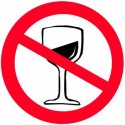Risky Drinkers Less Likely to Take Good Care of Themselves & Seek Medical Care
Kaiser Permanente Study Finds Heavier Drinkers Have Worse Health Care Habits
Women and men who engage in frequent heavy drinking report significantly worse health-related practices, according to a Kaiser Permanente Center for Health Research study in the journal Addiction Research & Theory.
For the study, researchers surveyed 7,884 members of the Kaiser Permanente Northwest integrated health plan in Oregon and Washington. They found that risky drinkers have attitudes and practices that may adversely affect their long-term health and that people who drink at hazardous levels were less likely than other categories of drinkers to seek routine medical care.
Risky drinking was defined in three different ways to account for both short and long-term alcohol-related risks: 1) those who, on average, drank three or more drinks per day, 2) women who consumed four or more drinks during one sitting, or men who drank five or more drinks during one sitting, or 3) people identified as at-risk drinkers using a commonly used screening tool.
“The main finding here is that risky drinkers also engage in other behaviors — such as relieving stress with alcohol and cigarettes, not wearing seatbelts, unhealthy eating and not regularly seeing their doctors — that put their health at risk,” said study lead author Carla Green, a senior investigator at the Kaiser Permanente Center for Health Research. “Physicians should not only be concerned about patients’ heavy drinking, but also these other health-related practices.”
The study, funded by the National Institute on Alcohol Abuse and Alcoholism, is the first to examine the relationship between drinking patterns and health while taking into account a wide-range of other factors that might influence that relationship.
Those factors include diet, exercise, stress management, sleep practices, seat belt use, income, education, obesity, as well as feelings about seeing the doctor, skepticism toward medical care, and attitudes about personal ability to influence health.
“Our study found that men and women who drank the most had less collaborative relationships with their doctors and were more likely to dislike going to the doctor. They were also less confident they could change their own health-related practices and more likely to think health is a matter of good fortune,” Green said.
While the study clearly showed a negative relationship between health and daily, heavy drinking, it also found that moderate drinking was associated with better health. In fact, on a standard health status survey, people who drank one-to-three drinks daily reported slightly better health than all other categories of drinkers, including life-long abstainers, former drinkers, light drinkers (less than one drink a day) and heavier drinkers (three or more drinks per day). People who drank moderately were also more likely to have better health-related attitudes and practices, and more likely to seek routine medical care.
“Even after taking these other health-related attitudes and practices into account, there was still a small but independent relationship between moderate drinking and better self-assessed health,” said Michael Polen, study co-investigator at the Kaiser Permanente Center for Health Research. “Previous research has linked moderate alcohol drinking with cardiovascular benefits, so that might be the underlying reason moderate drinkers report better health. It’s also possible that there are additional factors we didn’t measure that account for this positive relationship.”
The study was conducted by reviewing mail-survey responses of 7,884 Kaiser Permanente members from 2002 and 2003. The survey was linked to two years of electronic health records and service use data to study how drinking patterns affect willingness to seek health care. Each of the members, aged 18 to 64, responded to a survey that measured physical and mental health as well as health-related attitudes and practices.
Authors of the study’s three papers include: Carla A. Green, PhD, MPH, Michael R. Polen, PhD, Shannon L. Janoff, MPH and Nancy A. Perrin, PhD at the Kaiser Permanente Center for Health Research; Michael C. Leo, PhD, Oregon Health & Science University; Bradley M. Anderson, MD, chief of Addiction Medicine, Kaiser Permanente Northwest; and Constance M. Weisner, DrPH, University of California and Kaiser Permanente Division of Research.
source: http://www.prnewswire.com
